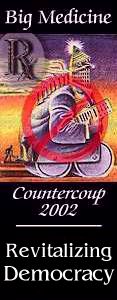BIG MED Rx FOR VITAL DEMOCRACY
HUMANISING CORPORATIONS TO
ENRICH CITIZENS & DEMOCRACY
How to Create an Ownership-Transfer-Corporation
by By Shann Turnbull
|
Corporations create, concentrate and control wealth on an undemocratic basis and are in turn controlled by institutional investors not accountable to citizens. We need to introduce tax incentives to humanise corporations so that they become socially accountable, more efficient and profitable, and promote far greater economic equity.
Tax incentives would encourage corporations to be owned and controlled directly by those citizens who sustain the existence of corporations as employees, customers or suppliers. Stakeholders would include citizens providing infrastructure services in the host localities. This would maximise local ownership, control and the self-determination of local communities. The corporate tax rate would be reduced so that it was more profitable for stockholders to agree to transfer, without payment, a small amount of equity each year to the stakeholders of record. Halving the corporate tax rate could provide sufficient incentive to transfer a 5% equity per year. In this way an Ownership Transfer Corporation (OTC) is created to transfer ownership and control from investors to stakeholders over a 20 year period. It is a win-win outcome for investors, stakeholders and government. Investors obtain higher returns, stakeholders, which include management, are enriched with assets, income and votes, and the government tax base is transferred from corporations to individuals who pay tax at a higher rate. The government also wins by replacing government welfare cheques with corporate dividend cheques. A much more important but subtle result is that the size of corporations will be reduced to human scale. This is because shareholders in OTCs would create pressure on management to fully pay out the higher profits created by the tax incentive. Otherwise, investors would lose some equity each year in any retained profits. Business growth would be financed by shareholders re-investing their higher dividends in offspring corporations, which acquired operating units from the Progenitor Company. This would increase economic efficiency as the re-investment of corporate cashflows becomes subject to market forces rather than management discretions. The introduction of stakeholders to the ownership and control of enterprises in a way recommended by Prof. Michael Porter would increase the competitiveness of corporations. OTCs would establish independently elected but separate advisory "Stakeholder Councils" (Like Citizen Utility Boards) for customers, employees and suppliers. Each council would help to create a "loyal opposition" to the self-interest of other stakeholders to formulate and negotiate win-win outcomes for all concerned rather than just for management and investor elites as occurs at present. OTCs can be established under current corporate laws by stockholders agreeing to create "Stakeholder stock", which obtains equity rights from the common stock at the agreed rate (say 5% p.a.). Stakeholder stock is issued on an open ended basis pro-rata to the market value contributed by citizens directly or indirectly through working for stakeholder enterprises. In this way citizens instead of institutions would broadly share corporate ownership and control on a localised democratic basis.
HOW TO CREATE AN OWNERSHIP TRANSFER CORPORATION (OTC)
NOTE. Such 'rights' issues would fulfil the role of dividend re-investment plans. The investors would require OTC's to distribute all their surplus cashflow each year so dividend payments would be much higher than in corporations with perpetual, static, monopoly property rights. OTC's create time limited, dynamic, sharing property rights.
Shann Turnbull
Australia's Macquarie University Many of his papers on stakeholder democracy and corporate governance are available online from Social Science Electronic Publishing. |
Have more seminal suggestions?
Email them to us at: bigmed@nancho.net

